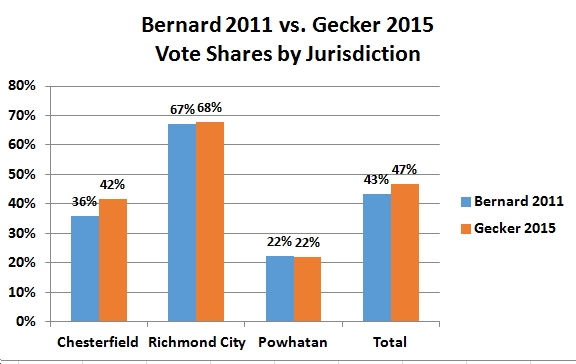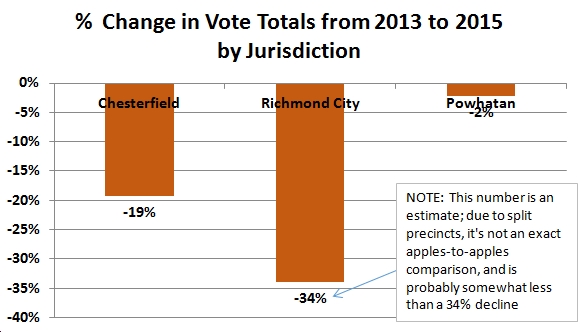 You might recall this past spring, when one of the most hotly-contested Democratic primaries in Virginia was in SD-10, the seat held by Sen. John Watkins (R), who is retiring. The three candidates for the Democratic nomination were: 1) Dan Gecker; 2) Emily Francis; 3) Alex McMurtrie. In my endorsement of Emily Francis, I noted that she was “by FAR the strongest progressive and environmentalist in the field; it’s not even remotely a close call.” I further argued:
You might recall this past spring, when one of the most hotly-contested Democratic primaries in Virginia was in SD-10, the seat held by Sen. John Watkins (R), who is retiring. The three candidates for the Democratic nomination were: 1) Dan Gecker; 2) Emily Francis; 3) Alex McMurtrie. In my endorsement of Emily Francis, I noted that she was “by FAR the strongest progressive and environmentalist in the field; it’s not even remotely a close call.” I further argued:
…on electability, I’ve argued many times that the key to Democrats doing well in this year’s low-low-turnout, off/odd-year Virginia elections for General Assembly is turning out the Democratic “base.” That means nominating candidates who can appeal to said base, which Emily Francis clearly can do.
In stark contrast, Dan Gecker played a key role in trying to impeach President Bill Clinton, has stated that his political hero is arch-Republican Ronald Reagan, identified himself for years as an “independent” not a Democrat, and even mused that he might vote Republican for President in 2012 rather than voting to reelect President Obama!
Other than Democrats pouring huge sums of money into the district, which presumably they’ll do regardless of who wins the nomination on June 9, why on earth would the Democratic “base” get excited about someone like that?
Also note that Gecker was heavily backed by Gov. McAuliffe, Senate Democratic Leader Dick Saslaw, etc. Their theory, apparently, was that the conservative Democrat/Independent Gecker would be best positioned to perform well in Chesterfield County, where he serves on the Board of Supervisors, while his LESS progressive (to put it mildly) leanings might help him win “crossover votes” (if any such thing still exists in this day and age, which I doubt it does in large numbers) in places like Powhatan County. A further assumption, apparently, was that despite his conservative and lukewarm-about-Obama feelings, Gecker would nonetheless be able to motivate the Democratic “base,” in places like heavily African American Richmond, to turn out on election day. Yeah, seems dubious to me too. Also dubious is the idea that a strong, articulate, energetic progressive woman like Emily Francis somehow wouldn’t outperform Gecker among the “base” sufficiently to outweigh her (falsely) assumed underperformance in Chesterfield and Powhatan counties.
There are so many problems with these assumptions, it’s hard to even know where to begin, but let’s give it a shot. The following analysis is largely from a smart Virginia Democratic politico who prefers to remain anonymous. Having said that, I strongly agree with their analysis, so what you see below is my edited version of what the politico sent me, plus thoughts of my own intermingled.
First, let’s look at something REALLY interesting: it turns out that long-time Independent and conservadem Dan Gecker’s performance in Richmond City and Powhatan County were almost identical to the performance of 2011 Democratic nominee David Bernard — who ran on a strong environmental and progressive platform – in Richmond City (67% support for Bernard, 68% for Gecker), as well as in Powahatan County (where Bernard and Gecker each received 22% support). In Chesterfield County, where Gecker serves on the Board of Supervisors, he received 42% support in the 2015 election, compared to 36% support for Bernard in 2011. That’s ok, but doesn’t exactly knock one’s socks off.
What’s truly eye-popping here is that strong environmentalist and progressive Bernard did as well as he did in 2011, even though he received essentially ZERO financial support (Bernard spent only $39,172 vs. Watkins’ $465,850!) — against an entrenched incumbent no less. In stark contrast, this time around, Dan Gecker spent around $2 MILLION, huge chunks of which came from Gov. McAuliffe’s PAC, from the Democratic Party of Virginia, and from outside spending by Michael Bloomberg’s “Everytown for Gun Safety.” Yet, despite all this money, plus the fact that Gecker was running in an open seat against a non-incumbent, Gecker managed to basically get the same vote share as the essentially unfunded progressive Bernard in “blue” Richmond City and “red” Powhatan County. In the end, Gecker only outperformed Bernard in Chesterfield County, where Gecker serves on the Board of Supervisors, and even there only by 6 percentage points. Big whoop, huh?
As for voter turnout, we actually saw a smaller proportion of the electorate come from Powhatan (-4 percentage points) this time around, when compared to 2011. So much for Gecker’s “crossover appeal” in that “red” county. We DID see a somewhat bigger proportion of the electorate coming from Chesterfield (+3 percentage points), with Gecker outperforming Bernard there by 6 percentage points. That’s fine as far as it goes, but obviously it wasn’t enough on election day. What was needed, clearly, was much larger voter turnout in Richmond for the Democratic nominee from the Democratic “base.” Instead, we saw Richmond’s proportion of the vote increase by just 1 percentage point from 2011 to 2015. Meh.
 Another way of looking at this is to compare each individual locality’s 2015 turnout to its 2013 gubernatorial election turnout. The main theme here is that Powhatan voters were extremely consistent in their turnout, down just 2 percentage points from 2013. In contrast, Richmond City saw a 34 percentage-point decline (at most) from 2013 (“at most” because of split precincts, which make it hard to compare the gubernatorial election to the State Senate election), while Chesterfield saw a 19 percentage-point decline in turnout from 2013.
Another way of looking at this is to compare each individual locality’s 2015 turnout to its 2013 gubernatorial election turnout. The main theme here is that Powhatan voters were extremely consistent in their turnout, down just 2 percentage points from 2013. In contrast, Richmond City saw a 34 percentage-point decline (at most) from 2013 (“at most” because of split precincts, which make it hard to compare the gubernatorial election to the State Senate election), while Chesterfield saw a 19 percentage-point decline in turnout from 2013.
Also worth noting is that unfunded progressive Bernard outperformed highly-funded consevadem/Independent Gecker in 20/64 precincts in SD10 (ignoring the 3 absentee “precincts” in each locality): 8 of 12 Powhatan precincts (103, 201, 202, 302, 402, 501, 502, 503); 3 of 23 Chesterfield precincts (408, and two in Gecker’s Supervisor Magisterial District 513, 515); 9 of 29 Richmond precincts (the “red” 102 plus the overwhelmingly Democratic 203, 404, 412, 508, 903, 908, 909, 910). Again, Bernard did that with essentially no money against an entrenched incumbent, while Gecker had $2 million supporting him in an open-seat race.
So all this brings us back to the interesting, albeit admittedly unknowable (you can’t go back in time and rerun elections under different conditions) idea that perhaps a strong progressive like Emily Francis, running an almost pure “base turnout” election year, could have done better than Gecker – possibly even winning the district, and with it, A few items for consideration include:
- A strong progressive such as Emily Francis would almost certainly have seen higher voter turnout in heavily “blue” areas like Richmond. Also note that Francis would have had a significant grassroots presence and emphasis, plus inherent characteristics (i.e. female, younger, not a status quo politician, etc.) that would likely have excited additional voters (i.e. women, young voters, disenfranchised communities, progressives, environmentalists).
- Francis would have likely increased Richmond performance above Bernard’s base level of 67%, quite possibly above 70%.
- Given that Bernard in 2011 and Gecker in 2015 performed about the same in Powhatan, it doesn’t appear that whether the Democrat is conservative or progressive really matters to that county’s voters — they are going to vote for whoever has the “R” by their name, basically. The only question in Powhatan is whether a young, progressive female candidate like Francis might have been able to squeeze a few more Democratic votes out of Powhatan than unexciting conservadem Gecker.
- As for critics who believed that Francis could not generate enough votes in Chesterfield County, a counterargument is that, unlike Gecker, she wouldn’t have carried the baggage of casting bad votes that angered certain Chesterfield voters and specifically Midlothian residents. Most likely, Francis would have held her own in Chesterfield. Note that, as the RTD reported this morning, “Gecker failed to carry his home precinct and portions of the 10th that fall in the Midlothian District, which he represented on the Chesterfield Board of Supervisors.” Ouch.
- One can also speculate that Alex McMurtrie, who has as well-known and intense dislike of Gecker, would never have endorsed Glen Sturtevant over Emily Francis, as he did with Sturtevant over Gecker. Who knows how much of a difference that made, but Sturtevant certainly touted it.
- On a similar note, it’s quite possible that the Democratic “establishment” was hoping for a John Watkins endorsement of Gecker, and assumed that Watkins would never endorse a strong progressive like Francis. Yet, in the end, despite going all-out for the conservative Democrat, it didn’t work: Watkins ended up endorsing Sturtevant anyway. Hmmm.
- Finally, one has to assume that progressives would have played a larger role in Francis’s campaign—groups such as Democracy for America, Emily’s List, and NOW all endorsed and supported Francis in the primary but provided NO support to Dan Gecker in the general election. These groups’ on-the-ground, field-based support (as opposed to high-priced, wildly wasteful and ineffecient broadcast TV advertisements) would have been an extra injection of tried-and-true election tactics, “boots on the ground” so to speak. One also would assume that the national progressive community would have been far more likely to be enthused — and to donate money, phone banking, etc. – for Francis than for Gecker, who worked to impeach Bill Clinton and said he wasn’t even sure if he’d vote to reelect Barack Obama in 2012 for god’s sake.
Again, we can’t rerun the 2015 election for the 10th Virginia State Senate district, so we can never know for certain whether we would have seen a different result if Democrats had nominated a more progressive, younger, female candidate like Emily Francis. In a super-low-turnout election year, though, where it’s mostly a “get out/excite the base vote” exercise, it’s hard to imagine that Francis would have done any worse than Gecker. The question is whether Francis could have squeezed out another 1,500 votes (from Richmond, of course, but also from progressive voters in Chesterfield and Powhatan) and won this election. My guess is that she could have, and I made this argument repeatedly leading up to the Democratic primary in June. But, sad to say, we will never know what might have been…












